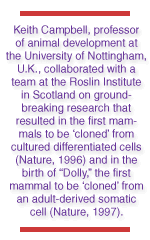|
|
||||||
|
|
World-Renowned Cloning Expert to Lecture March 17 - 18 
Keith Campbell, a cloning expert internationally renowned as part of the scientific team that cloned "Dolly," will give a public lecture, "Cloning Technology and Its Implications," at 5:30 p.m. Monday, March 17, in the Mellon Institute Auditorium, second floor, 4400 Fifth Ave. Campbell's talk is the Ninth Annual Pittsburgh Conference Lectureship on Applications of Spectroscopy and Molecular Biology to the Biomedical Sciences. A technical lecture, "Reprogramming the Genome by Nuclear Transfer," will be held at 3 p.m., Tuesday, March 18, also in the Mellon Institute Auditorium.
Results of Dolly's cloning were widely publicized in the press and became a lightning rod for heated discussion of the merits of human embryonic stem cell cloning, or therapeutic cloning, to understand and treat disease, as well as the potential for human reproductive cloning as an option for infertile couples seeking to have a child. Campbell, a professor of animal development at the University of Nottingham, U.K., collaborated with Ian Wilmut and a team at the Roslin Institute in Scotland on groundbreaking research that resulted in the first mammals to be 'cloned' from cultured differentiated cells (Nature, 1996) and in the birth of "Dolly," the first mammal to be 'cloned' from an adult-derived somatic cell (Nature, 1997). Dolly died this past February.
Sponsors of the lecture include the Spectroscopy Society of Pittsburgh, the Society for Analytical Chemists of Pittsburgh, the Pittsburgh NMR Center for Biomedical Research, and the Department of Biological Sciences at Carnegie Mellon. The Pittsburgh Conference Lectureship on Applications of Spectroscopy and Molecular Biology to the Biomedical Sciences recognizes outstanding contributions to the field by scientists from an international base.
A reception in the Social Room of the Mellon Institute (third floor) will be held immediately following the public lecture. Complimentary parking is available Monday only at the Dithridge Street Garage, center entrance.
Lauren Ward
|
||||
|
Carnegie Mellon Home |
||||||
 The team conducted this work to understand basic mechanisms underlying cellular differentiation and to provide a means for the precise genetic modification of farm species, according to Campbell. At the University of Nottingham, Campbell continues basic research to improve the cloning process and the production of therapeutic stem cells to produce animal models for cell therapies and develop strategies for transplantation.
The team conducted this work to understand basic mechanisms underlying cellular differentiation and to provide a means for the precise genetic modification of farm species, according to Campbell. At the University of Nottingham, Campbell continues basic research to improve the cloning process and the production of therapeutic stem cells to produce animal models for cell therapies and develop strategies for transplantation.